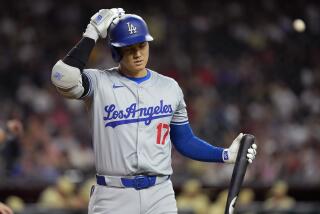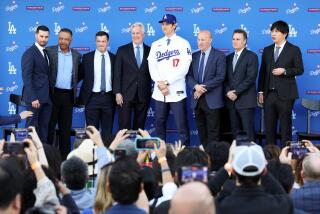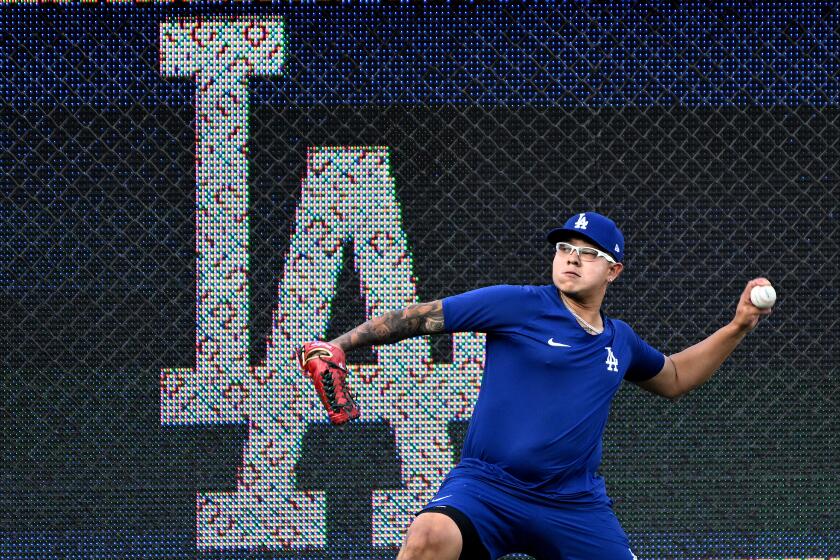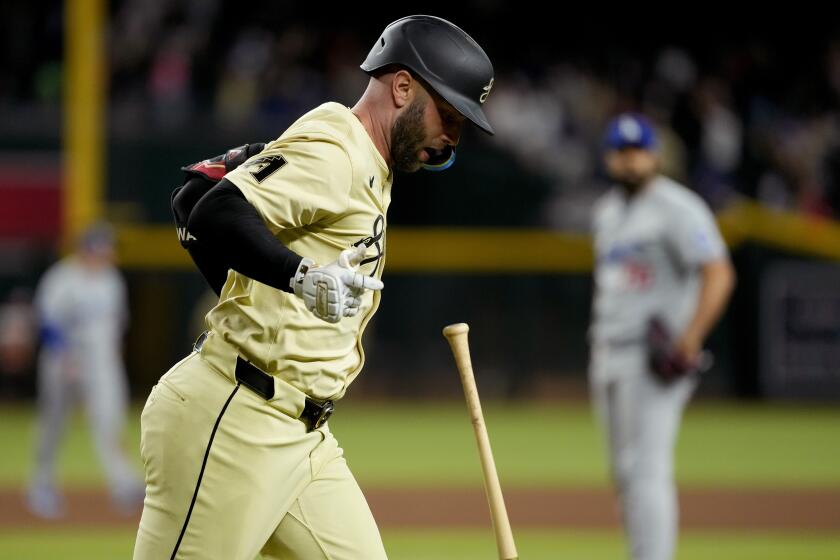Command(er) performances
One was soothed by his small-town roots, the other energized by the bright lights of a big city.
One was content with a closet-sized office visited only by his coaches, the other insistent on expansive quarters, stocked with a vast array of Italian delights and often filled with Hollywood celebrities.
One masked his feelings and guarded his words in public, the other could explode at the slightest provocation.
Walter Alston and Tom Lasorda may have been as different as could be on a personal level, but professionally, they were quite similar.
Both arrived in the big leagues with major league credentials hardly worth mentioning. Both managed in the minors, both went on to manage the Dodgers, both enjoyed a longevity that spanned decades, both won World Series championships and both wound up in the Baseball Hall of Fame.
Between them, Alston and Lasorda led the Dodgers for 43 years. This will be the 12th full season since Lasorda retired and Joe Torre is their sixth manager over that period.
Torre certainly arrives with a better reputation than did Alston when he was hired in 1954 to manage the Brooklyn Dodgers. The general reaction of the New York media to the 42-year-old Alston’s arrival was, Walter who?
Alston had enjoyed great success in the minor leagues where he had been a league-leading home run hitter four times and had managed for 13 seasons. But that didn’t exactly wow them in Brooklyn, where big league credentials were all the mattered. Alston’s major league experience consisted of one at-bat for the St. Louis Cardinals in 1936. He struck out.
This was the man who was going to take over a two-time defending National League pennant winner?
In the book “Bums,” sportswriter Charles Einstein recalled Alston watching slugger Duke Snider in the batting cage in Alston’s first spring training.
When the manager questioned Snider about the position of his back leg, the outfielder snapped back, “I hit 42 home runs in the big leagues last year. Where did you make your mistakes?”
It didn’t help that the Dodgers finished second in Alston’s first season, second to the hated New York Giants.
But all was forgiven a year later when he led his team to Brooklyn’s first world championship.
And all was forgotten as far as Alston’s controversial hiring by the time he arrived in L.A. in 1958 with four years of big league experience under his belt and a World Series ring on his finger.
“After being under such heavy media scrutiny in New York,” said former Dodgers general manager Fred Claire, “Walt found the media in Los Angeles much friendlier, much more accepting.
“He was never overwhelmed.”
Not that the criticism was totally muted. When the Dodgers struggled in their first season in L.A., team owner Walter O’Malley had to give his manager a vote of confidence in June. The Dodgers finished seventh that season, but Alston was soon vindicated when the team won another World Series in 1959 and again in 1963 and ’65.
Los Angeles may have embraced Alston, but the reverse just wasn’t going to happen. No need to look for his picture in the society pages. The only bright lights Alston basked in were those at the Coliseum and Dodger Stadium.
During the season, he lived in a small apartment near what is now the Grove in West L.A.. When the season was over, he went back to his beloved Darrtown, Ohio, where he could be found in the winter woodworking, horseback riding, hunting and trap shooting.
After managing 3,658 major league games, eighth on the all-time list, and winning 2,040 of them, sixth best in baseball history, Alston retired at the end of the 1976 season and returned to Darrtown. He was elected to the Hall of Fame in 1983 and died a year later at 72.
The quiet aura Alston took with him was dramatically shattered by the ebullient Lasorda, who loudly pledged perpetual loyalty to the big Dodger in the sky and bragged his blood flowed Dodger blue.
Like Alston, Lasorda struggled in his bid to become a big-league player. A southpaw pitcher, Lasorda spent 14 seasons in the minors and 26 games in the big leagues over three seasons, two with the Brooklyn Dodgers and one with the Kansas City Athletics. Lasorda’s major-league record was 0-4 with a 6.48 earned-run average. He was angry when the Dodgers, with only one roster spot left on the 1955 team, picked another left-hander over him, Sandy Koufax.
Now, when asked about it, Lasorda smiles and says, “How do you know what I would have done?”
He did plenty after returning to the Dodgers organization as a scout, minor league manager, coach and, finally, Alston’s successor.
Lasorda won 1,599 games, 13th best in league history, managed 61 postseason games, third all time, and won two World Series championships, four pennants and eight division titles.
His philosophy: “I believe managing is like holding a dove in your hand. If you hold it too tightly, you kill it, but if you hold it too loosely, you lose it.”
Ever quotable, Lasorda was known for his profanity-laced tirades, none of them fit for a family newspaper.
There is no such restriction of his view of the fragile nature of the ballplayers he managed.
“I walk into the clubhouse,” Lasorda once said, “and it’s like walking into the Mayo Clinic. We have four doctors, three therapists and five trainers. Back when I broke in, we had one trainer, who carried a bottle of rubbing alcohol, and, by the seventh inning, he had drank it all.”
Forced to give up his precious place in the dugout in 1996 because of heart problems, Lasorda, now 80, has never left the organization.
Inducted into the Hall of Fame in 1997, Lasorda briefly served as Dodgers general manager before becoming a front-office consultant and a motivational speaker around the world.
He also never lost his touch with ballplayers. Lasorda, at 73, managed the U.S. team to an Olympic gold medal at the 2000 Sydney Olympics.
And this spring, with part of the Dodgers squad off on a brief exhibition tour of China, Lasorda returned to the dugout to manage the remainder of the squad.
Alston and Lasorda, an odd couple to be sure, but inseparable in terms of the legacy of a half century of Dodgers baseball.
--
More to Read
Are you a true-blue fan?
Get our Dodgers Dugout newsletter for insights, news and much more.
You may occasionally receive promotional content from the Los Angeles Times.






